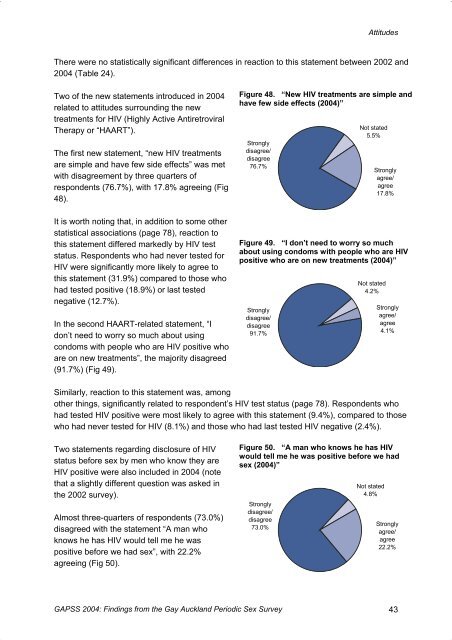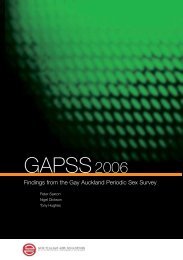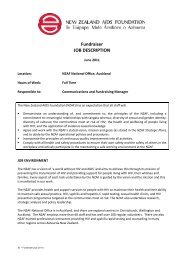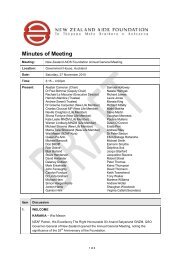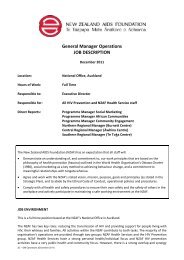GAPSS 2004 - New Zealand Aids Foundation
GAPSS 2004 - New Zealand Aids Foundation
GAPSS 2004 - New Zealand Aids Foundation
Create successful ePaper yourself
Turn your PDF publications into a flip-book with our unique Google optimized e-Paper software.
AttitudesThere were no statistically significant differences in reaction to this statement between 2002 and<strong>2004</strong> (Table 24).Two of the new statements introduced in <strong>2004</strong>related to attitudes surrounding the newtreatments for HIV (Highly Active AntiretroviralTherapy or “HAART”).The first new statement, “new HIV treatmentsare simple and have few side effects” was metwith disagreement by three quarters ofrespondents (76.7%), with 17.8% agreeing (Fig48).It is worth noting that, in addition to some otherstatistical associations (page 78), reaction tothis statement differed markedly by HIV teststatus. Respondents who had never tested forHIV were significantly more likely to agree tothis statement (31.9%) compared to those whohad tested positive (18.9%) or last testednegative (12.7%).In the second HAART-related statement, “Idon’t need to worry so much about usingcondoms with people who are HIV positive whoare on new treatments”, the majority disagreed(91.7%) (Fig 49).Figure 48. “<strong>New</strong> HIV treatments are simple andhave few side effects (<strong>2004</strong>)”Stronglydisagree/disagree76.7%Not stated5.5%Stronglyagree/agree17.8%Figure 49. “I don’t need to worry so muchabout using condoms with people who are HIVpositive who are on new treatments (<strong>2004</strong>)”Stronglydisagree/disagree91.7%Not stated4.2%Stronglyagree/agree4.1%Similarly, reaction to this statement was, amongother things, significantly related to respondent’s HIV test status (page 78). Respondents whohad tested HIV positive were most likely to agree with this statement (9.4%), compared to thosewho had never tested for HIV (8.1%) and those who had last tested HIV negative (2.4%).Two statements regarding disclosure of HIVstatus before sex by men who know they areHIV positive were also included in <strong>2004</strong> (notethat a slightly different question was asked inthe 2002 survey).Almost three-quarters of respondents (73.0%)disagreed with the statement “A man whoknows he has HIV would tell me he waspositive before we had sex”, with 22.2%agreeing (Fig 50).Figure 50. “A man who knows he has HIVwould tell me he was positive before we hadsex (<strong>2004</strong>)”Stronglydisagree/disagree73.0%Not stated4.8%Stronglyagree/agree22.2%<strong>GAPSS</strong> <strong>2004</strong>: Findings from the Gay Auckland Periodic Sex Survey 43


